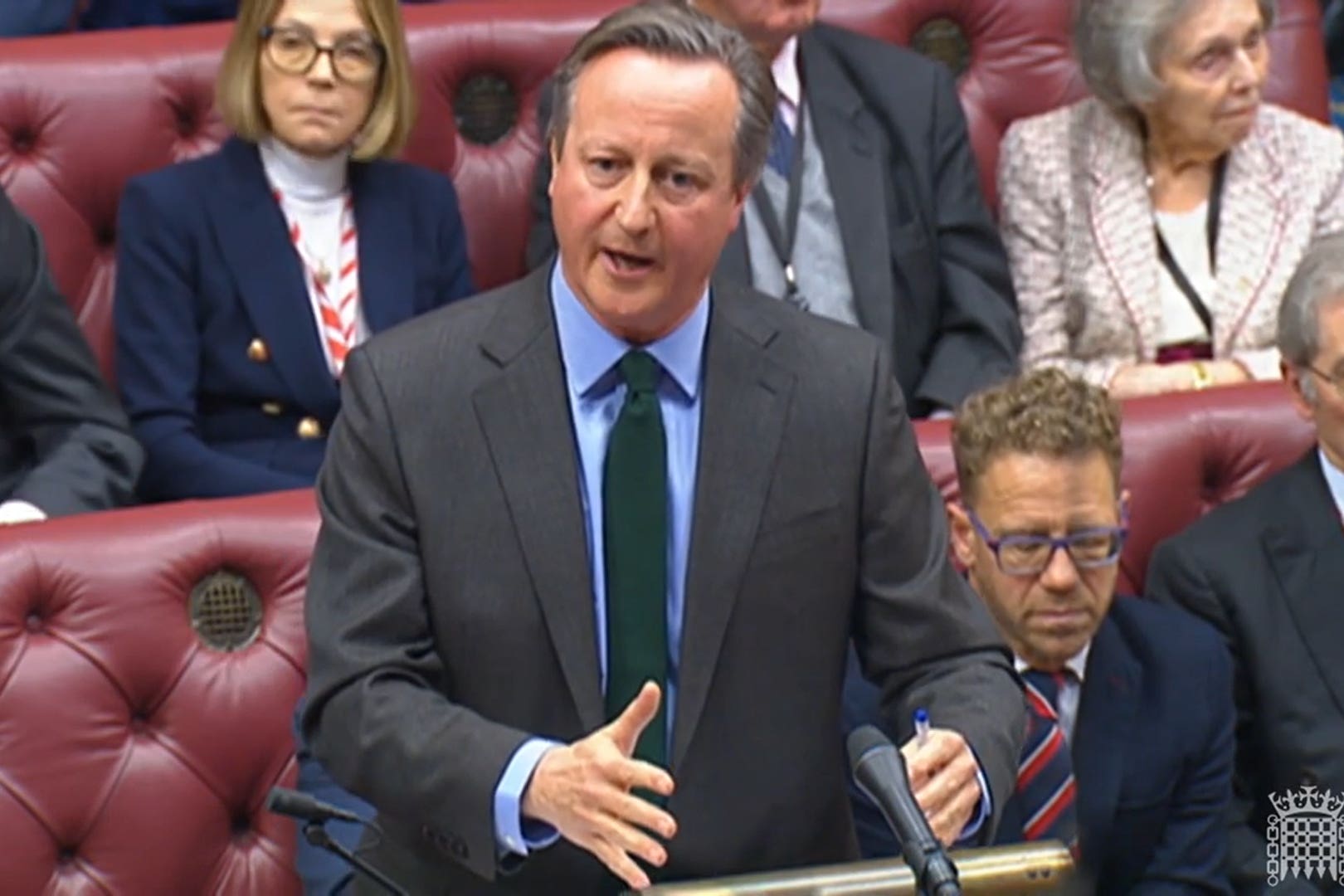UK defence firms could do more to help arm Ukraine, says Lord Cameron
Lord Cameron was pressed over support for Ukraine at his first question time in the House of Lords, after his shock return to frontline politics.

Your support helps us to tell the story
From reproductive rights to climate change to Big Tech, The Independent is on the ground when the story is developing. Whether it's investigating the financials of Elon Musk's pro-Trump PAC or producing our latest documentary, 'The A Word', which shines a light on the American women fighting for reproductive rights, we know how important it is to parse out the facts from the messaging.
At such a critical moment in US history, we need reporters on the ground. Your donation allows us to keep sending journalists to speak to both sides of the story.
The Independent is trusted by Americans across the entire political spectrum. And unlike many other quality news outlets, we choose not to lock Americans out of our reporting and analysis with paywalls. We believe quality journalism should be available to everyone, paid for by those who can afford it.
Your support makes all the difference.British defence companies could do more to boost weapons production and help arm Ukraine, Foreign Secretary David Cameron has said.
The Cabinet minister was unable to tell peers how much military aid the UK would give to the war-ravaged country next year, but assured them it would be the same “or even ahead” of past commitments.
Lord Cameron was pressed over support for Ukraine at his first question time in the House of Lords, after his shock return to frontline politics.
Labour peer Lord Robertson of Port Ellen, a former Nato secretary general, said: “The Ukrainians are not just fighting for their country, for their land and for their lives, they are also fighting very much for us.”
He stressed the need for Ukraine to receive more weapons and ammunition.
Responding, Lord Cameron highlighted the support already provided to the Kyiv government, which he said referred to the UK as “their number one partner”.
He added: “I think the one area where we can do more is in trying to mobilise the British defence industries to produce the stocks that are needed rather than simply running down stocks.
“We can also work with European allies. Sometimes if they are reluctant to give support they may be able to backfill some of our capabilities and we can give more.
“I am absolutely clear, the military support is essential. That is what is helping Ukraine to succeed.”
Independent crossbencher Baroness Meacher asked: “What commitment can the Foreign Secretary make in terms of what weapons and how much are we spending on weapons for 2024 for Ukraine?”
In reply, Lord Cameron said: “I don’t have the figure here for what 2024 will provide. All I can say is we are absolutely committed to continuing to support Ukraine at the level or even ahead of what we have done.”
Later, in comments likely to infuriate unionist politicians in Northern Ireland, Lord Cameron hailed the revamped deal on post-Brexit trading arrangements “a superb negotiation”.
Opponents argue the Windsor Framework, which reformed the Northern Ireland Protocol, retains a border in the Irish Sea, disrupting trade with the mainland.
The DUP has maintained its long-running boycott of Stormont as it seeks assurances, by way of legislation, over the region’s place in the UK internal market.
The ongoing difficulties caused by the framework to Northern Ireland was raised with the Foreign Secretary by former Labour MP Baroness Hoey, a Brexit supporter who sits as a non-affiliated peer.
She urged Lord Cameron to talk with the EU about alternatives “that could do away with the Irish Sea border and not be dividing our own country”.
Responding, the Cabinet minister said: “I had nothing to do with negotiating the Windsor Framework so I can say this with true meaning – I think it was a superb negotiation.
“The EU said it would never reopen the Withdrawal Agreement and it did. They never, and I can say this with real feeling, give an emergency brake and yet they did when it came to Stormont, and they never really make exceptions for single market access for non-single market countries and yet they have.
“I absolutely understand her concerns and worries about it, but I think it was a good negotiation.
“I think it can fulfil the seven tests that the Democratic Unionists have put forward and I know the Secretary of State for Northern Ireland is working extremely hard to try and put the institutions back together again.”